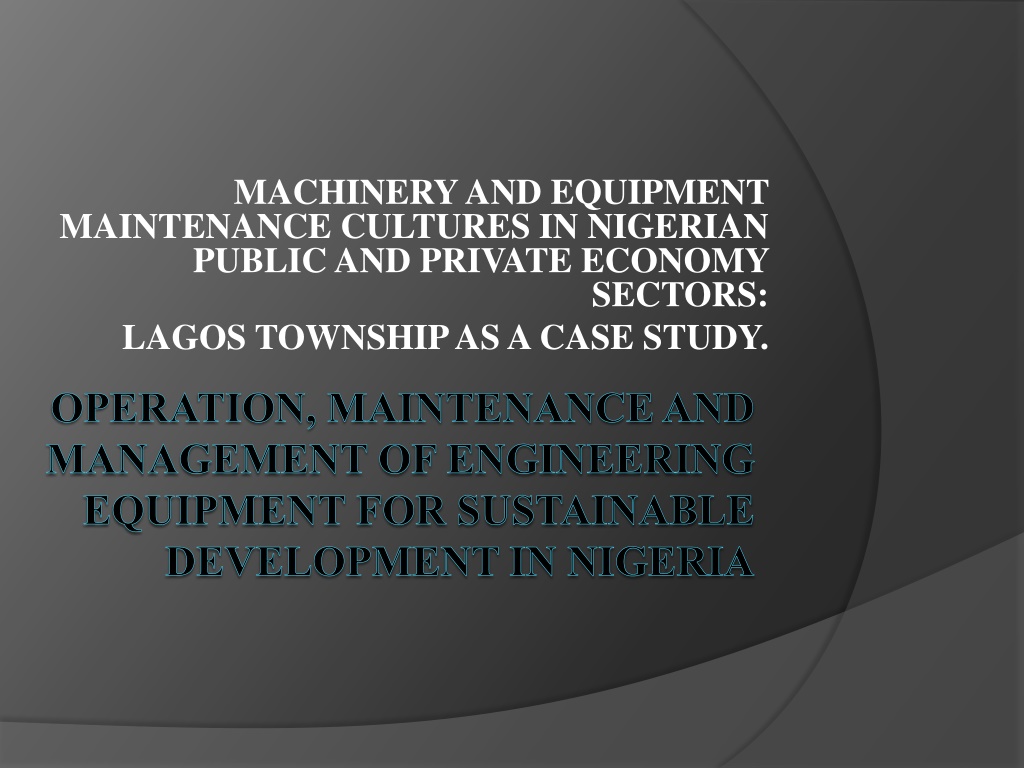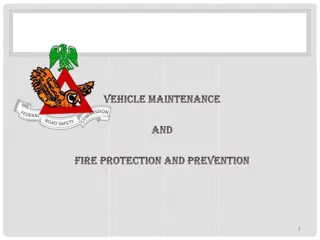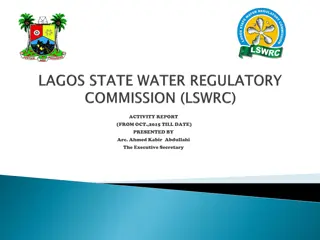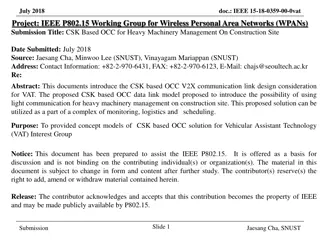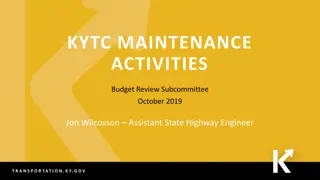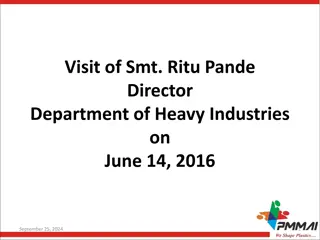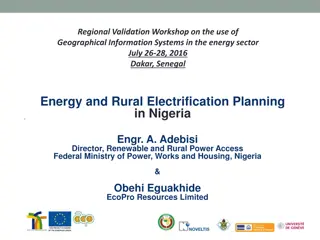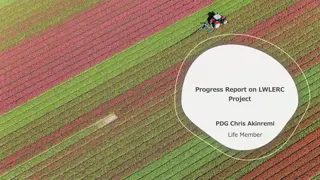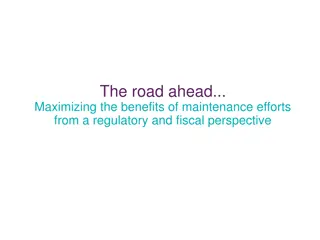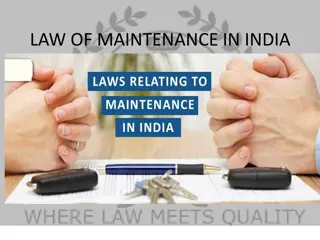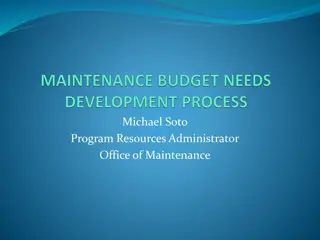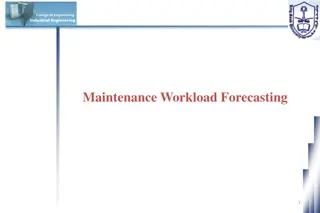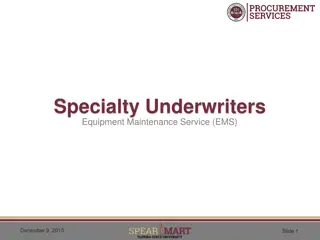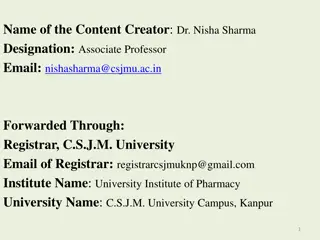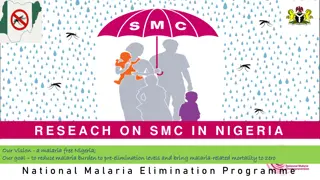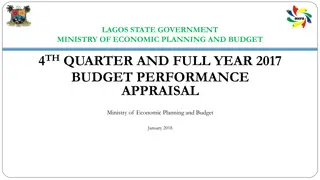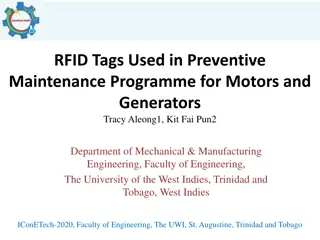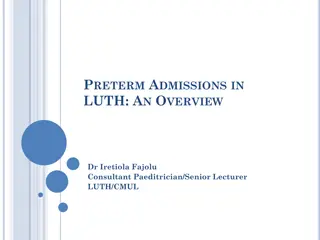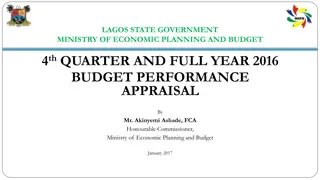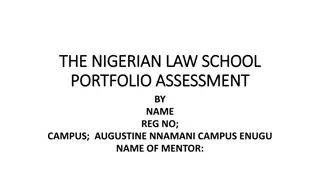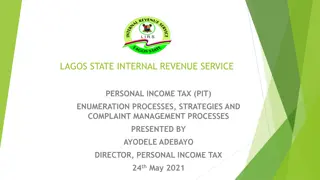Machinery and Equipment Maintenance Cultures in Nigeria: A Study in Lagos Township
Poor maintenance culture affects productivity in Nigerian public and private sectors. This study evaluates plant maintenance in Lagos, highlighting the need for improved practices to achieve sustainable development and economic growth.
Uploaded on Oct 01, 2024 | 0 Views
Download Presentation

Please find below an Image/Link to download the presentation.
The content on the website is provided AS IS for your information and personal use only. It may not be sold, licensed, or shared on other websites without obtaining consent from the author. Download presentation by click this link. If you encounter any issues during the download, it is possible that the publisher has removed the file from their server.
E N D
Presentation Transcript
MACHINERY AND EQUIPMENT MAINTENANCE CULTURES IN NIGERIAN PUBLIC AND PRIVATE ECONOMY SECTORS: LAGOS TOWNSHIP AS A CASE STUDY. OPERATION, MAINTENANCE AND MANAGEMENT OF ENGINEERING EQUIPMENT FOR SUSTAINABLE DEVELOPMENT IN NIGERIA
ABSTRACT Poor maintenance is known to be a significant factor militating against the achievements of enhanced productivity and full utilization of industrial facilities in developing countries like Nigerian (Sodiki, 2000).The ability of equipment, machineries or plants accurately and reliably to produce desired output could only be achieved through proper maintenance culture, which is significant to any nation s economical development. This paper appraises the status of plant maintenance culture in Nigerian public and private sectors, to provide adequate information that will be of help towards achieving effective operations through an enhanced total capacity utilization of equipment, tools, machineries or plants, a tool for better economic development. Different public and private sectors were randomly selected within Lagos metropolis. The result shows a significant difference in the level of plants maintenance in the selected public and private sectors, in favour of private sectors. The research also revealed a general average machinery and equipment maintenance culture in Nigeria, which need to be improved on, to attain better and optimum plants operating condition required to satisfy expected needs of the nation at the minimum costs. This study recommended better working conditions for the skilled professionals; effective anti-corruption crusades at all levels; motivation towards enhanced local technological development for provision of good spare parts; comprehensive reforms to adopt systematic scheduling and standard maintenance policies in Nigeria, among others.
INTRODUCTION It is the desire of every human being to live or use any structure such as It is the desire of every human being to live or use any structure such as building, tool, equipment or machine comfortably without fears of its failure or building, tool, equipment or machine comfortably without fears of its failure or uncertainty about its reliability. The engineering structures are built to achieve uncertainty about its reliability. The engineering structures are built to achieve economy and structural stability (Schid, 1981). Failure of such structures is economy and structural stability (Schid, 1981). Failure of such structures is generally associated with either improper design or poor maintenance. generally associated with either improper design or poor maintenance. Continuous use of structures (materials) over time leads to gradual Continuous use of structures (materials) over time leads to gradual deterioration and damage of such structures, such as general surface wears, deterioration and damage of such structures, such as general surface wears, cracks, loss of skid resistance, rots, ultimate failure, etc. Hence, newly cracks, loss of skid resistance, rots, ultimate failure, etc. Hence, newly constructed devices, tools or plant machineries will definitely require continued constructed devices, tools or plant machineries will definitely require continued maintenance over short time period and complete rehabilitation in long term. maintenance over short time period and complete rehabilitation in long term. Practically, all components of an operation system are subject to deterioration Practically, all components of an operation system are subject to deterioration (degradation) and occasional failure in performing their assigned tasks. The (degradation) and occasional failure in performing their assigned tasks. The rate at which the deterioration occurs and how frequently breakdown forces rate at which the deterioration occurs and how frequently breakdown forces render the equipment or machineries and its users idle and perhaps the entire render the equipment or machineries and its users idle and perhaps the entire production depend on the design of the process and operation condition. production depend on the design of the process and operation condition.
Maintenance is the plant (including machine tools) improvement programmes designed to prevent or correct all deviations from optimum operating condition (i.e. efficiency), production capacity and product quality (economy) during their expected useful life, without, in any way, affecting the safety and well being of those employed (Sharma, 2006). The ability of equipment, tools and machinery accurately and reliably to produce desired outputs has an importance especially in manufacturing industries (Lawal, 2003). If proper machinery and equipment maintenance is put in place, the plant including buildings, grounds, equipment, and production machinery in the as-built condition is nearly possible (Gordion et al, 1972). This will lead to guaranteed optimum operation condition that satisfies the expected demand at minimum cost. Priel (1974), Lindey et al (1995) and Uhiara (2002) realised from their findings that the main importance derivable from equipment and machineries maintenance include optimum performance, minimum possibility of failure, achievements of planned life span of machine, minimum operational cost by preventing major repair works from arising, reduction in the chance of scrap production, improvement in the morale of the machine operator, and qualities of the products are improved with proper maintenance. Information necessary for design improvements of those items whose inherent reliability proves in adequate are also obtained from adequate maintenance. Proper maintenance requires adequate maintenance management by maintaining the production system at the reasonable level and still maximizing profit, and minimizing cost using the two (2) types of policies i.e. reducing the frequency of failure and / or reducing the severity or seriousness of failure. Engineering valuation and facilities maintenance management are said to be key functions of an engineer (Somolu, 2003). LITERATURE REVIEW Several factors are known to have contributed to the failures of engineering machineries and equipment, which can occur singly or in combination. The factors include poor design, poor workmanship or inaccuracy during construction, poor material selection, poor construction materials, unforeseen circumstances and poor maintenance culture. Sodiki (2000) indicated poor maintenance as one of the factors militating against the achievement of enhanced productivity and full utilization of industrial facilities in developing countries like Nigeria. With good maintenance culture, the plant failure from other factors could be easily detected and addressed appropriately to avoid loss of live, waste of money, inefficiency or poor reliability, unsafely operations or its other consequences.
LITERATURE REVIEW The major maintenance usually carried out on machinery and equipment in Nigerian public and private sectors include preventive, corrective, routine, breakdown and overhaul maintenance. These maintenance types are carried out singly or in combination mainly towards effective utilization of mechanical plant and equipment. The equipment, plants or their components are categorized in order of their importance in the industries or public sectors as critical, major or minor components/plants or equipment. This categorization is the first step in maintenance processes (Lindsey, et al, 1995). The failure of critical components/plants or equipment such as pumps, valves, digesters, washer, etc. in an operation system brings the entire production system to a standstill and result in high cost. It requires high control and intensive maintenance. The major components/plants or equipment (such as stock chests (washed and refined), Decker, secondary screen and secondary cleaners, etc.) in their own case contribute mainly to the smooth performance of an operation system, but their failure does not disturb operations seriously or force production to a halt. They consequently require moderate control and moderate maintenance effort. Minor components/plants or equipment are supportive elements whose failure may contribute to sub- optional performance of an operation, but do not disturb operation in any obvious way. Hence, limited control and no formal maintenance effort may be required. Examples of components in this category are foam breakers, washer scrappers, etc. Private sector is an organisation of a nation s economy, which consists of those entities which are not controlled by the state, such as private firms and companies, corporations, private banks and non-governmental organizations (wordeg.com, 2004), which is set up for making profit. It is owned and controlled by individuals or group of people. The public sector in its own case is set up by governments at different levels (i.e. local, state or federal) mainly for the comfort and better welfarism of the members of the society in particular and the society at large. It is non-profit in nature. The public sector is controlled or operated by the government or its agent.
METHODOLOGY The objectives of the two sectors could only be achieved through the use of various tools, machineries, equipment's or plants. Presently, the two sectors are not adequately serving the Nigerian populace as expected. The turnout from the sectors does not satisfy the need of the people technologically and economically. This problem is attributed to ineffective and low total capacity of the equipment, tools, machineries or plants used, among others, as result of poor maintenance culture According to Dolapo (2003), the ability of equipment, tools, machineries or plants accurately and reliably to produce desired outputs has an importance, especially in manufacturing industries. Equipment, acquisition in industries or public sectors is less significant to their maintenance, due to its vital importance in economic and historical developments, considering technical depreciation of plants, benefits as results of replacement, etc. Hence, it is so important to always appraise the maintenance culture in every economic sectors of a nation for effective operations through an enhanced total capacity utilization of equipment, tools, machineries or plants, a tool for better economic development. tools, machineries or plant
RESULT The result revealed that better maintenance activities take place in Nigerian private sectors than their public counterparts. The poor maintenance culture in public sector is attributed to very hard process in securing approval for procurements of spare parts, the poor attitude of workers in Nigeria towards the use and maintaining the public (government) properties, corruption, poor maintenance record keeping, and poor systematic scheduling of maintenance works, improper maintenance supervision, poor funding and poor maintenance management (Ademulegun, 2007). Poor attitude towards maintenance of government projects is a major problem of sustenance of such properties in Nigeria (NSE, 2003). Size, level of maintenance experts, adequate in-house maintenance specialists, adequate funding and proper supervision of works done by the outside specialists (contractors) are factors for better performance in private sectors. It also reveals proper maintenance supervision, adequate use of standard planned and preventive maintenance programmes in private sectors. The type of maintenance mostly practiced in Nigerian public sectors is breakdown maintenance. That is, they do not embark on maintenance until when the plant is failed or totally shutdown. Meanwhile, it was further revealed that the public sectors shows their uncared attitude to plant maintenance before failure, because of the belief that no one works for government with stress . This attitude was confirmed with their utterances that the workers or the establishment losses nothing at the end of the idle period , since the public sectors are usually funded by the government, without given a profit target.
ANALYSIS OF RESULT This finding is also in line with the view of Nigeria Society Engineers, NSE (2003) that maintenance is an issue so frequently over looked in Nigeria. Sodiki (2000) also revealed that the problem of poor maintenance in Nigeria arises partly from political and cultural values, and as a result of low level of awareness and technicality regarding maintenance matters. Political and cultural values have been hindering ease procurements of spare parts needed for adequate plant maintenance in Nigeria. The problem of low maintenance performance in Nigeria public and private sectors could also be attributed to low level of awareness regarding maintenance matters, unavailability of genuine parts, and low level of technical (maintenance) experts, poor record keeping, poor technical scheduling programme, and unstable economic status, among others. Uhiars (2002) realised through his research findings that adequate trained manpower, spare parts and other maintenance materials are in short supply in Nigeria. This seriously hinders good and effective maintenance culture. In Nigeria, the orientation of the private sectors executive towards profit making, through more production of goods and reduction in cost is another factor hindering good maintenance culture in their establishments. It is believed that maintenance do reduce their profits and consequently affect their achievements adversely. There is need to accept the maintenance function, as the aims of the organization may not initially conform to the main aim and objectives of production. At the long run, proper maintenance culture will enhance the productivity and full capacity utilization of industrial facilities. Priel (1974) identified sharp contrast between the ways in which work is done towards the goals of production and means through which objectives of maintenance is achieved.
CONCLUSIONS In conclusion, this study revealed that there is significant difference in the machinery and equipment maintenance cultures in Nigerian public and private economy sectors. The public sectors perform better in plants maintenance than the public sectors. The Nigerian cultures/attitudes towards machinery and equipment maintenance need to be improved, for better and optimum plants operating condition, such as efficiency, production capacity and product quality, to satisfy expected Nigerian needs at minimum costs.
RECOMMENDATIONS To proffer solution to the maintenance problems revealed by this paper, the following recommendations are made: The Nigerian public and private sectors need to encourage the skilled professionals by provision of better working conditions, enhanced staff welfare, etc., as their services are significant to achieve better plants maintenance. Governments and different organizations need to encourage people towards good maintenance culture at all level. Nigerians are to be orientated on importance of good maintenance culture to the society The public sectors need to be privatised. The privatization has to be since one. Adequate funding of the public sector is required to cater for their maintenance problem There is need for development of good maintenance policies. This policies include : *How often the equipment's and tools are maintained *What to be done to damaged tools and maintained *Measures to be taken to prevent further damages to the tools and equipment Maintaining proper record about the tools and equipment Need for effective anti-corruption crusades at all levels Sincere Re branding of Nigeria Motivation towards enhanced local technological development for provision of good spare parts, etc. Improvement on Nigeria political and cultural values. Public sectors need comprehensive reforms to adopt systematic scheduling and maintenance works. Need for adequate on job training programs on maintenance know-how for technical staff to enhance their technological knowledge. Okoye (2003) suggested appropriate and adequate job training on maintenance know-how for Nigerian technical staff in both private and public sectors.
REFERENCES Ademulegun, F. (2007), Engineering Maintenance , Fradem educational Publishers, Ado-Ekiti. Abduulkareem, O.A. and Yusuf, L.A. (2005), Assessing the Present State of Machinery and Equipment Maintenance both in Public and Private sectors in Ilorin Metropolis, HND Project Report, Dept. of Mechanical Engineering, Kwara State Polytechnic, Ilorin, Nigeria (Unpublished). Gordion, B.C., Harold, A.B. and Hewitt, H.Y. (1972), Production Handbook , The Ronald Press Company, U.S.A. Lawal, K.O. (2003), Towards Effective Utilization of Mechanical Plant & Equipment in Nigeria , The Proceedings of the National Engineering Conference, Lagelu 2003, Nigerian Society of Engineers (NSE), Lagos. pp. 93-104. Lindey, R.H., dale, P.B. and Mobley, R.K. (1995), Maintenance Engineering Handbook , McGraw-Hill, New York, pp.2-30. NSE (2003), New-Bussa Engineer , vol.1, No.1 (Oct. Dec), Nigeria Society of Engineers (NSE), New-Bussa, pp.9 Okoye, C.I (2003), Strategies for Effective Maintenance Culture for Sustanable Infrastructural Development in Nigeria , The Proceedings of the National Engineering Conference, Lagelu 2003, Nigerian Society of Engineers (NSE), Lagos. pp. 132-138. Priel, V.Z. (1974), Systematic Maintenance Organization , Maldonald and Evans Ltd., London,
